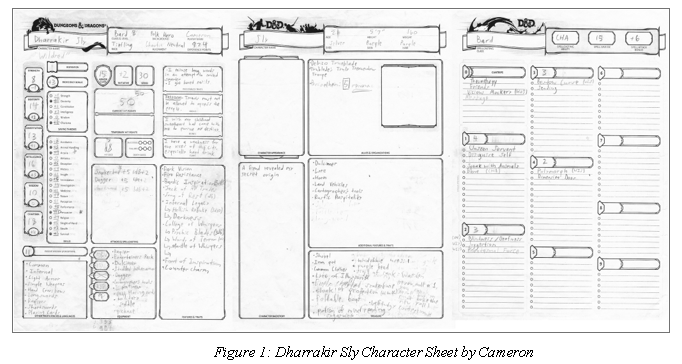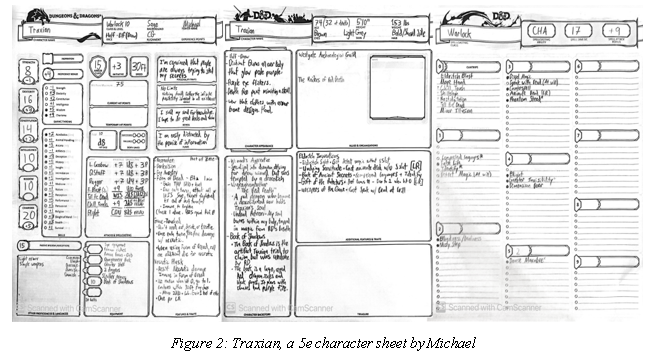Assignment Description
This project was created in the Fall of 2022 for Writing & Rhetoric Foundations with Professor Bryan. This assignment requires students to investigate and analyze a chosen genre in a specific context, using Writing Studies concepts to understand its history and purpose within a discourse community. The report should present findings and evidence from the research, offering conclusions based on the student's interpretation of the genre's impact. Various approaches, such as exploring workplace genres or studying online message board posts, are suggested to inspire students in their research endeavors.
Project
Dungeons & Dragons, also known as D&D, has been a bastion of nerd and pop culture since its release in the 1980s, and now, the classic tabletop roleplaying game is more popular than ever thanks to the hit show Stranger Things, which heavily features it, and the web show Critical Role hosted by celebrity voice actors. For those not familiar with it, D&D is not the kind of game that players can win. Instead, it is a collaborative experience that stimulates the player’s imagination, tests their knowledge of the game’s mechanics, and relies on their storytelling skills to create an engaging experience for everyone involved. Multiple studies show that the highly social, collaborative nature of D&D helps students score higher on standardized tests, and better prepares them for an interdisciplinary learning experience (Darvasi). It is a game that utilizes both the player’s mechanical comprehension and rhetorical skills and uses the genre of the character sheet to make that happen.
I collaborated with Versus Games, a local game store that hosts D&D games every week to collect examples of character sheets and interview longtime players of the game about their thoughts on how character sheets function as a genre, and how it affects D&D as a rhetorical environment.
The main function of a character sheet is to be a reference tool. Players reference the information they’ve written on the character sheet throughout “the campaign” (the narrative, the quest, the story). That information can give them insight into how certain conflicts will play out before role play and dice rolls. For example, if a player’s character has low intelligence, the likelihood of them solving a complex puzzle or being able to read text in another language is low.
The character sheet is created before the first session of the game. This is where the imagination of the player and the rules of the game first meet. During this stage, the player must deconstruct the idea they have in their head for a character (for example, a half-elf assassin from the slums who doesn’t like teamwork) into measurable statistics, such as strength, charisma, wisdom, and intelligence. These statistics act as a baseline for how the player character will interact with everything in the world, and each has its statistics in other reference texts, such as the Player’s Handbook and Volo’s Guide to Monsters. This procedure of the player putting their concept to paper grounds their idea, no matter how grand, to the reality of the game, and it is the first time the player will find themselves thinking and writing in the language of the game. The Player’s Handbook even provides specific formulas for stats.
Many rhetorical objects within genres have lots of variance, with some common elements contextualizing the object to its genre. For example, no two rock songs sound the same, but almost all of them have guitar riffs and lyrics about similar topics. A character sheet has little variance. The rules and formula for making a character sheet are always the same, and anyone who has made a character sheet in the past can consider themselves literate in the genre. However, that doesn’t mean character sheets aren’t different, or subject to change.
A character sheet is meant to be fluid so that it can be updated to reflect its living context: the campaign. Character sheets are kept in a mutable medium, such as a pencil or a Word document, to make themselves amenable to changes. For its players, the character sheet serves as a living record of the campaign, and this living record includes things such as new items abilities gained, and even injuries.

For example, in this three-page character sheet, Versus Games regular, Cameron, has played his character, Sly, for seven years in about twenty different adventures. If you look at the Features section on page 1, you can see it has been erased and rewritten several times. The Treasures section on page 2 has been subtracted from and added to.

Compare that to Figure 2, a fresh sheet from a player named Michael, whose campaign has yet to begin. None of the sections have been erased and written over. The treasures section is still blank. there aren’t any notes or annotations from the stories. Another difference of notes is the stylistic difference between these two players. Cameron has only offered a sentence for his backstory, while Michael has composed a bulleted list. Michael chose to make notes about his character's appearance.
When talking about the study of genres in Materiality and Genre in the Study of Discourse Community, Bawashari says, “... the community is not just a backdrop of language behavior, but a growing, moving environment that includes text and speech as its constituents, just as people are its members. We create our discourse communities as we write and speak within them” (in text citation). In D&D, the player group forms the community and social environment in which the character sheet exists. Thus, character creation works best as a collaborative experience. For example, if every character in the group has high strength and low charisma, their party is unlikely to succeed if presented with a diplomatic conflict. A lack of diversity makes the party completely dysfunctional. A player may have a great idea for a character, but they need to consider the needs of the whole before running wild with the whims of their imagination.
The function of the D&D party is similar to that of the discourse communities Swale refers to in The Concept of Discourse Communities in at least four ways. The party works towards a common goal, has a system of intercommunication (roleplay), uses its genres (such as the character sheet) to further its goals, and uses its specific lexis to progress towards its aim (the words on the character sheet and the language of the game) (Swale). For example, in Scenario A, Player B can ask Player C to use Ability D to solve the scenario. When the campaign begins, the players collectively set the tone for the language, and contribute to its vocabulary as the campaign evolves with things like references and inside jokes.
I asked Charlie Fray, who works every Sunday when Versus Games hosts D&D, for an example of how character sheets influence their social environment and the shape of the narrative. They said, “A good campaign is written around its characters, utilizing/mixing their backstories to craft a more inclusive narrative. For example, a campaign I was DMing included an evil spy organization, like the mafia. It was a huge part of the story’s first arc, and one of the characters was the son of the main antagonists in that organization. But that information was hidden from the other players. So the beginning of the campaign turned into a mystery adventure, where in addition to the main story, the players were slowly unraveling the exact alignment of their fellow adventurers. This created a lot of player intrigue in the story as a whole, as well as specific elements. In addition to the plot of the whole story, there were smaller elements they were seeking answers to.” In this situation, the backstory on the character sheet (hidden from the other players) affected the rhetoric of the discourse community and offered more narrative substance for the players to engage with.
Because D&D sheets are so formulaic and number-heavy, many may not consider it a writing genre, compared to a song, a five-paragraph essay, or a technical manual. Most have less than 200 words on them. It’s mostly numbers. However, D&D is an inherently rhetorical game, and the character sheet is the conduit that constrains the imagination of the player to the rhetoric of D&D and its mechanics. All the rhetoric of the game is based on how the sheet is written. I posed this question to Charlie (if he thought D&D and character sheets counted as writing and rhetoric), and he said this, “If you’re calling writing the purposeful use of language, then D&D is all writing. Everything from campaign writing and character creation to intense dragon fights and espionage missions, it’s all purposeful use of language. I feel like Rhetoric comes in that it’s not just writing a book, it’s a collaborative story. It falls on the individual to purposefully use their language to handle conflicts, and portray their character’s actions and feelings.”
While D&D is not the kind of game you win, that doesn’t mean it isn't challenging. Oftentimes, the players are put on the spot with an unexpected scenario, and forced to use the knowledge in their brain and their words intentionally to solve that scenario. As Charlie said, this is very similar to the challenges we face as Writing & Rhetoric majors. When I asked about the broader significance of D&D, he added, “[Players are] expressing a side of themselves they don’t get to in their day-to-day lives. I think D&D and this connection to their characters lets people feel out of social situations. D&D helps with anxiety and depression by helping people with routine and low-stress environments for them to express themselves. It also helps with gender dysphoria in that people get to express characteristics in a safe environment that might be more difficult in real life”(Fray). In addition to helping with mental health, studies praise D&D for helping students better engage with both the world and their education. I was in the D&D club in high school and believe that experience better prepared me for a Writing & Rhetoric education. While I won’t be asked to slay any dragons before I graduate, I will be faced every day with challenges where my choice of words affects my victory or defeat.